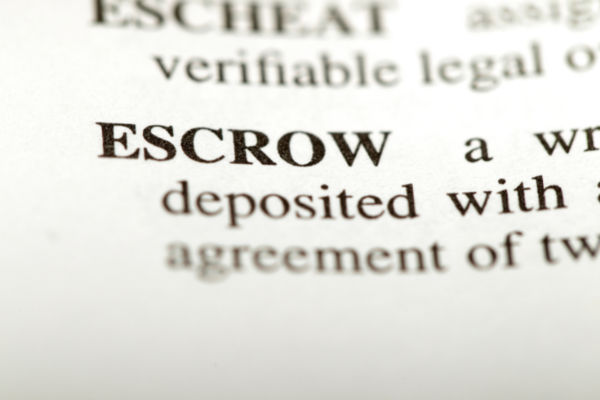Escrow And Your Mortgage: The Most Important Points To Know
 There are many complicated terms thrown around regarding your mortgage, and one of them is an escrow account. You will probably hear that your lender will collect some additional money every month for escrow payments. If you take a look at your mortgage statement, you will see your interest, your principal, and your escrow. What does this mean, and why do you have to pay additional money that isn’t going toward the balance of your loan?
There are many complicated terms thrown around regarding your mortgage, and one of them is an escrow account. You will probably hear that your lender will collect some additional money every month for escrow payments. If you take a look at your mortgage statement, you will see your interest, your principal, and your escrow. What does this mean, and why do you have to pay additional money that isn’t going toward the balance of your loan?
The Definition Of An Escrow Account
An escrow account is an extra account that your lender opens on your behalf to make sure certain expenses are covered. Because your mortgage investor has a lien against the property, the mortgage company has an interest in making sure your property does not fall into foreclosure. That means that you need to stay on top of all of your expenses, including those beyond your mortgage.
What Escrow Accounts Will Cover
Generally, your mortgage company will open an escrow account that is used to cover your home insurance premium and your real estate taxes. Generally, real estate taxes and home insurance premiums are only billed once per year. If you get a large bill for several thousand dollars, you might not be able to cover it. If you don’t pay your real estate taxes, the government could foreclose on your house. Instead of asking you to pay thousands of dollars at once, your mortgage company will open an escrow account for you, collecting small amounts of money every month to make sure you stay up to date on your home insurance taxes and premiums.
How The Balance In Your Escrow Account Is Determined
If your mortgage company is collecting additional money every month, that means there is less money for you to spend. Therefore, your mortgage company is careful only to collect as much money as required. Your escrow account balance is determined by your property taxes and insurance premiums. During an annual escrow review, your mortgage company will see if the account has a surplus balance. If it does, you will get a refund for the surplus balance. Keep in mind that if your real estate taxes or insurance premiums go up, your mortgage company may collect more money in the future.
Categories
- Around The Home
- Awards
- Bankruptcy History
- Budget
- Chapter 7 Bankruptcy
- Construction Loan
- Credit
- Credit Scoring
- Environmental Awareness
- Escrow Tips
- Fair Housing
- Federal Reserve
- FHFA
- Financial Crisis
- Financial Fraud
- Financial Reports
- Foreclosure
- Holiday Tips
- Holidays
- Home Building Tips
- Home Buyer Tips
- Home Buying Tips
- Home Care
- Home Care Tips
- Home Decorating
- Home Financing Tips
- Home Maintenance
- Home Mortgage
- Home Mortgage
- Home Mortgage Tips
- Home Mortgages
- Home Seller Tips
- Home Selling Tips
- Home Tips
- Home Values
- Home Values
- Homebuyer Tips
- Homeowner Tips
- Housing Analysis
- Housing Market
- Investment Properties
- Market Outlook
- Mortagage Tips
- Mortgage
- Mortgage Application
- Mortgage Guidelines
- Mortgage Rates
- Mortgage Tips
- mortgage-rates-whats-ahead-september-17-2012
- Organization Tips
- Personal Development
- Personal Finance
- Rankings
- Real Estate
- Real Estate Definitions
- Real Estate Tips
- Real Estate Trends
- Selling Your Home
- Student Loans
- Tax Debts
- Taxes
- The Economy
- Travel
- Uncategorized